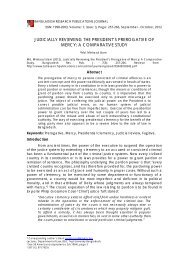john donne, a poet more of spirituality than of sensuality
john donne, a poet more of spirituality than of sensuality
john donne, a poet more of spirituality than of sensuality
Create successful ePaper yourself
Turn your PDF publications into a flip-book with our unique Google optimized e-Paper software.
John Donne, a Poetsearch <strong>of</strong> the truth. At first Donne seems to have responded to the excitements <strong>of</strong> the city,London in 1590’s, as he is found to be a great visitor <strong>of</strong> ladies, a great frequenter <strong>of</strong> plays,a great writer <strong>of</strong> conceited verses. This is the picture <strong>of</strong> Donne in his earlier life where herepresents a brilliant young man <strong>of</strong> town, as has been confirmed by Richard Baker, abiographer. But, in the latter part <strong>of</strong> his life, he has produced the most brilliant <strong>of</strong> his poemsthat becomes moral in theme. Donne’s marriage with Anne Moore brings him face t<strong>of</strong>ace with the problems and difficulties <strong>of</strong> real life. That situation is summed up in a punningepigram: John Donne, Anne Donne, undone. This marriage also helps Donne to find thereal meaning <strong>of</strong> love where he finds both body and soul important. This helps to definethe relation between men and women. After the death <strong>of</strong> his wife, Anne Donne, Donne isseen to be engrossed with his unresolved religious position and the death, itself. He findsthe peace in the discussion <strong>of</strong> death, soul, God and ultimately wishes to seek true religion.In this way Donne’s <strong>poet</strong>ry is a journey from the excitements <strong>of</strong> earthly life to theenlightenment <strong>of</strong> the soul. That is why Donne is a <strong>poet</strong> <strong>more</strong> <strong>of</strong> <strong>spirituality</strong> <strong>than</strong> <strong>sensuality</strong>.ReferencesAbrams, M.H. (1998). A Glossary <strong>of</strong> Literary Terms. Wordsworth PublishingBennett, J. (1984). Five Metaphysical Poets. Great Britain: CambridgeBush, D. (1963) English Literature in the Earlier Seventeenth Century. N. York: OxfordCookson, L and Loughrey, B. (1990). The Metaphysical Poets. Great Britain: LongmanEmden, J.V. (2005). The Metaphysical Poets. India: Replica Press Pvt. Ltd., KundliEliot, T. S. (1953). Selected Prose. U.K: Harmonds worthFerguson, Salter, and Stallworthy. (1996). The Norton Anthology <strong>of</strong> Poetry. United States <strong>of</strong>America: W.W. Norton & CompanyGardner, H. (1965). John Donne: The Elegies and the Songs and Sonnets. United States <strong>of</strong>America: OxfordGardner, H. (1962). John Donne, A Collection <strong>of</strong> Critical Essays. United States <strong>of</strong> America:Prentice-Hall, Inc., Englewood Cliffs, N.J.Handley, G. (1991). The Metaphysical Poets. Great Britain: Macmillan PressLovelock, J. (1973).Donne: Songs and Sonets. Great Britain: Macmillan Press.Lewis, C. S. (1964). The Discarded Image. New York: CambridgeMallett, P. (2001). John Donne, Selected Poems. India: Pearson Education (Singapore) Pte.Ltd, India Branch, 482 F.I.E. Patparganj, Delhi-110092, IndiaStephen, M . (2000). English Literature, a student guide. England: Pearson EducationLimitedRedpath, T. (1956). The Songs and Sonets <strong>of</strong> John Donne. Great Britain: Cambridge103http://www.bdresearchpublications.com/journal/
















